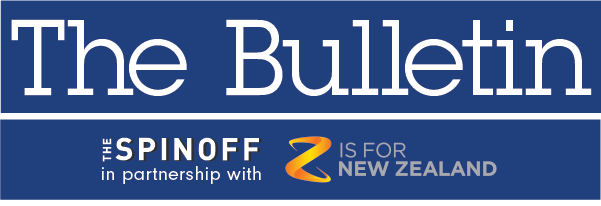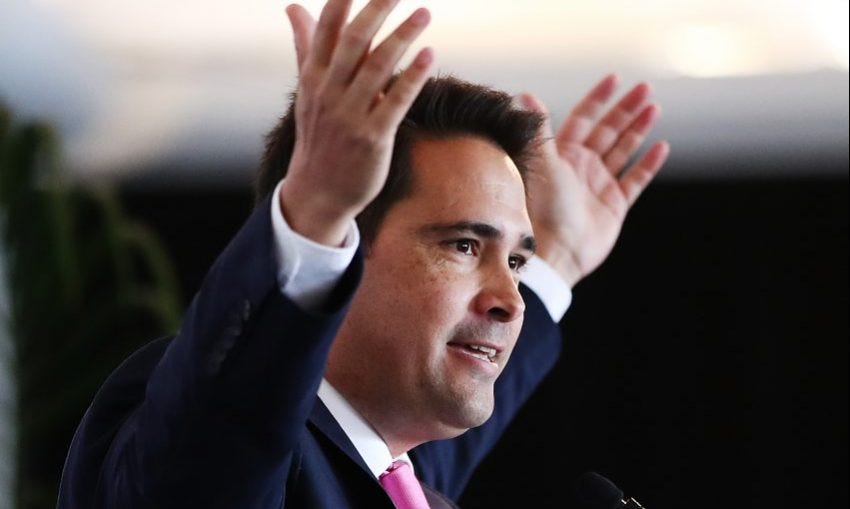
Good morning and welcome to The Bulletin for Friday 22 May, by Alex Braae for The Spinoff. Presented in partnership with Z Energy.
In today’s edition: Showdown today for the leadership of National, climate change commissioner lashes budget failings, and Fonterra picks up earnings amid uncertainty.

(Getty Images)
It's all going down in the National caucus today, and we'll see later on who will emerge victorious. The party again suffered a very poor polling result last night, with the One News Colmar Brunton survey putting them at just 29%, against a whopping 59% for Labour. That obviously doesn't bode well for Simon Bridges today – though in fairness, he was at 5% in the preferred PM stakes, against 0.2% for challenger Todd Muller. There is also a slim outside chance of another MP emerging from the caucus room as the winner, and this has been a pretty wild year so far, but it really does seem unlikely.
Are we any clearer on who is going to win? The general ether of commentary and sources would suggest that it is still extremely close, but Muller has a slight edge. One on the record account comes from Politik, where it is reported that the camp around Bridges "was aware last night that defeat was likely today." For many MPs, it could be a real sliding doors moment in their careers – back the right horse now, and they'll have a much better chance of a list ranking that would allow them to survive if the party suffers a heavy defeat in September.
So far, the Nats have been reasonably dull in maintaining their discipline – at least in public. But there was one fantastic piece of forthrightness from a provincial MP to highlight. East Coast veteran Anne Tolley told the Gisborne Herald that the challenge was "nutty stuff", and a sign of panic from some of the newer MPs in caucus, who don't know what it's like to really be in the depths of opposition. On that point, commentator Liam Hehir has looked at the overall process of this challenge, and ponders whether it is a sign that the party is no longer outward-looking enough to win an actual election. We also had an emergency episode of the Gone By Lunchtime podcast – I'd recommend listening to this very soon, or else the news will have moved on.
Meanwhile, Labour will be thrilled at their surge, but the poll did not bode well for their allies. Both NZ First and the Greens would be out on the numbers they got, and they'll desperately need some of those who have gone to Labour to come back. In fact, the only party apart from Labour that could look at this poll with any satisfaction is Act – if the numbers fall like this, they'd be up to 3 MPs, and by default the 3rd largest party in parliament.
Just quickly, a message from The Spinoff's managing editor Duncan Greive:
"The arrival of Covid-19 and lockdown changed The Spinoff, transforming our editorial to focus on the biggest story of our lives, taking a small team and making it a seven day a week news operation. But it also fundamentally changed us as a business, too. Prior to the crisis, around 20% of our editorial costs were funded by our Members. Now, that figure is north of 50%. The loss of some key commercial clients meant that change has to be permanent. If you're already a member, please know that all at The Spinoff are incredibly grateful for your help. If you're not, and can afford to contribute, please consider doing so – it really is critically important to our ability to cover the next phase of the crisis, in all its complexity."
I intended to give this story a much more prominent run this week, but as is often the way with news, events took over. So belatedly, the new climate change commissioner Rod Carr has criticised the government's recent budget as being too weak on emissions, reports Eloise Gibson for Stuff. For context on Carr's role, the commission's job is to advise the government on what policies and plans they need to implement in order to meet the legal requirements of the Zero Carbon Act. So this criticism is significant, and is essentially a notice that the government's current approach will not be sufficient.
There is still some unallocated money that could be put towards more climate friendly plans. Interest also reported on Carr's comments, which argued that "these funds can only be spent once. We need to make decisions that our children and grandchildren will thank us for." Carr also wants to see a specific climate change chapter heading in next year's budget, to give it the same prominence as areas like health, education and housing.
Fonterra has improved its earnings for the year, but significant uncertainty still remains for the future of the financial performance of the cooperative, reports the ODT. Demand is softening right now, and there's no telling what effect a global recession could have. ASB's rural economist Nathan Penny, who is quoted in the story, says Fonterra is still in "repair mode", as evidenced by the lack of any dividend being announced.
Among the various repatriation flights in and out of New Zealand, among the most important will be between here and India. The Indian Weekender has updated the progress that has been made on getting these flights over the line, with the first Air India flight scheduled to arrive in New Zealand on June 4. Approximately 2000 Indian citizens are currently stranded in New Zealand and looking for a way home, and there is no doubt there will be some New Zealanders looking for a way back from India too.
A survey released earlier this week showed little change in the dire statistics around reporting of sexual assault. Radio NZ reports 94% of such cases never get reported to the police, and of those, only a small proportion ever result in a conviction. The numbers are little changed on last year's survey. The survey was commissioned by the justice ministry, and minister Andrew Little said work was underway to make sure the processes used by police and courts supported victims.
There's disagreement in Queenstown over whether the AirBnb market really has been destroyed by Covid-19, reports Mountain Scene. The widespread assumption is that it has – with no international tourists there will obviously be far lower demand for places to stay. But the story speaks to two AirBnB property management companies who are confident that part of the industry will rebound, and hosts who stay in the market will be rewarded. They would of course have an interest in saying that, but it is possible.
From the Friday files: See how quickly time passes? It is now a full fortnight since that massive document dump, and most people will have by now forgotten all about it. Such is the nature of the communications tactic, and we've been lucky to see some fascinating stories come out of it all – not every Friday news dump gets the same treatment.
The point of today's story is not so much about the pertinent news detail, though it is an interesting one. This aide memoire note on the wage subsidy shows how the 80% income threshold came about – originally it was more likely to be 60%, but that changed about lobbying from the Council of Trade Unions. At the time of this document being written, there was also still a $150k cap on what firms could claim – about a week later, that had been lifted altogether.
But the thing I found most interesting about this document was a disclaimer at the bottom of a graph: "These costings are indicative only and have prepared in very limited time with high level firm demography data that does not fully capture all elements of the scheme." That's an exact quote too – I haven't just made one of my customary typos.
It captures something about what it would have been like for public servants in March. They had to smash advice and information out to the government so that decisions could be made for unprecedented circumstances. Then they had to change that advice to adapt to new circumstances. In a situation like that, perfect can be the enemy of good, and I think we can look back at these documents now and say on balance, the public service did a very, very good job.
Got some feedback about The Bulletin, or anything in the news?
Drop us a line at thebulletin@thespinoff.co.nz

Right now on The Spinoff: Our political editor Justin Giovannetti has arrived at the Beehive and sat down for a wide ranging interview with PM Ardern. Charles Anderson speaks to businesses that have been disrupted by Covid-19, and how they're adapting to the next normal. Dr Amanda Thomas critiques the recently announced RMA reforms, and concerns that they will shut communities out of decisions. Prem Maan from Southern Pastures writes about the potential profitability of carbon neutral farming. Sereana Naepi & Tara McAllister writes about the concern that university restructures will shut minority academics out. Simon Day shares some lessons from his first three months as a dad of twins. And Sam Brooks tries valiantly to list every ridiculous thing to happen on Sex and the City.
For a feature today, a fascinating look into the big business of podcasting, and how it could get taken over. Monopoly expert Matt Stoller has written about a deal signed by platform Spotify to get exclusive rights over the Joe Rogan podcast – which for those who don't know is arguably the biggest podcast in the world. Stoller sees this as part of a wider push by Spotify to monopolise audio content on the internet, in the same way that the likes of Google and Facebook monopolised online ad traffic revenue. Here's an excerpt:
What’s interesting, with either tying or exclusive dealing, is that Rogan has made it clear that there are likely to be few consumer benefits. He promised his listeners that “it will be the exact same show. I am not going to be an employee of Spotify. We’re going to be working with the same crew doing the exact same show.” The only difference is consumers won’t be able to get the Rogan show through other channels. It’s purely a restraint of trade. In other words, there’s literally no justification for this deal as anything but a payoff to Rogan from an aspiring monopolist who seeks to force Rogan listeners to use the Spotify app. It’s a leverage of Rogan’s legal monopoly over his own copyrighted material to create a distribution monopoly, which was one of the legal issues at stake in the 1948 Paramount decrees case that ended the monopolistic Hollywood studio system.
Now, I can imagine the argument that targeted advertising brings some sort of benefit I’m leaving out, that Rogan’s ad inventory will bring scale for podcast monetization. But the downside to consumers is quite obvious, while no one has been able to show that targeted advertising is a net positive.
Some wobbles have emerged about full participation in this year's Mitre 10 Cup. At the start of the day yesterday, as many as seven unions were looking shaky. Stuff later updated the story with confidence from Wellington, Manawatū, Southland and Otago that they'd all be there. But there are clearly financial issues for a lot of unions to get through, so it's worth watching this space to see if all 14 teams start the season.
That's it for The Bulletin. If you want to support the work we do at The Spinoff, please check out our membership programme




